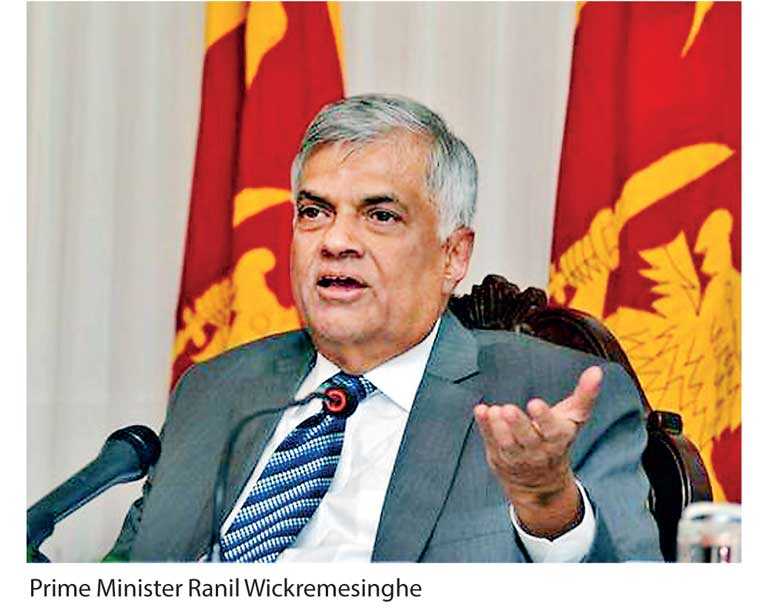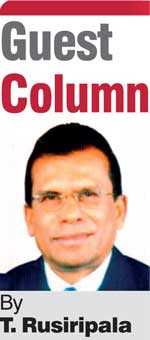Thursday Feb 12, 2026
Thursday Feb 12, 2026
Wednesday, 11 April 2018 00:00 - - {{hitsCtrl.values.hits}}

 According to Mr. Shyamon Jayasinghe, an Australian citizen, there is no provision in the Sri Lanka Constitution to remove or replace the Prime Minister once appointed. Whatever is spelled out by the interpreters of the Constitution, there cannot be a situation where there is no provision for the removal of a person from a position by the appointing authority.
According to Mr. Shyamon Jayasinghe, an Australian citizen, there is no provision in the Sri Lanka Constitution to remove or replace the Prime Minister once appointed. Whatever is spelled out by the interpreters of the Constitution, there cannot be a situation where there is no provision for the removal of a person from a position by the appointing authority.
Before we examine the veracity of the selected constitutional aspects highlighted by Shyamon, let us for a moment consider the ethics of good governance and established democratic principles underlying the position, as stated by him, viz. “However it is possible that he may lose the VNC brought in by the JO. Whatever may happen the move does not inflict terminal damage on the PM incumbent.”
What a sad state of affairs. In a democratically-elected Parliament, a group of duly-elected MPs exercise a legal right and a Parliamentary privilege to bring a No-Confidence Motion against the conduct of another Parliamentarian on specific allegations levelled against him. The Parliament accepts and passes the motion with a majority. But, alas! According to Shyamon, that Parliamentarian can continue regardless of the outcome because according to the constitution “he need not quit his role as Prime Minister”.
Such sadistic and unholy views and observations will make our country a laughing stock in the democratic world. In particular Shyamon should bear in mid the high degree of respectful democratic practice followed by the politicians in the country where he lives, Australia.
We are aware that even a person convicted for a major crime will look for ways and means of saving his neck from the gallows. That is human nature. But a person elected by the people to hold a position on their behalf, if resorts to hang on to a position despite, “whatever may happen” seeking refuge under legal provisions there could arise many repercussions. We have seen this happening recently in several countries. Only a few people like Shayman would advocate such a policy irrespective of serious consequences to the country, people and the political image.
In the current incident, the charges leveled against the Prime Minister are directly pointed and related to him. The CBSL bond scam is now a matter, clearly decided upon by:
nA private lawyers committee privately appointed by Ranil Wickremesinghe
nTwo COPE sittings appointed by the Parliament of Sri Lanka
nA Presidential Commission of Inquiry which has submitted a report after a lengthy public investigation/inquiry.
The issues raised and the allegations leveled are specifically referring to some involvements established beyond doubt and others admitted by the PM himself. Because it is public knowledge I do not wish to dwell on such here. But if Shyamon wishes to enter into any debate or controversy, such details can be produced in most authentic manner as we have covered this episode in detail from the beginning.
The writer is attempting to show a distinction between a VNC against the PM and a NC against a Minister. According to him, however much a passed VNC is politically damaging to PM, he cannot be removed.
Perhaps people living overseas are exposed to information and events concerning politicians in all capacities where voluntary self-decided actions have saved the need for VNCs than us in Sri Lanka.
The underlying important factor is that how shameless one could be to disregard established opinions against him by other duly elected in a democratically functioning parliament. To seek refuge and cover under constitutional provisions in such situations appears to be mean, to say the least. President Mugabe also could not be removed constitutionally.
Now let us take a look at the constitutional provisions cited by Shyamon in his highly futile attempt to rationalise the PM’s action and trying to attribute creditability to a highly-uncreditable act.
He has cited Section 48(2) and has stated that “there is no objection for bringing a vote of No Confidence”. But the Section is totally irrelevant to the issue confronting the PM. Section 48(2) provides for rejection of Government policy or the Appropriation Bill and it does not deal with situations of improprieties, irregularities or performance faults of Ministers, MPs or PMs. Hence his citation is irrelevant and misleading in the current context.
The other Constitutional provision he has cited is 46(2). This too is not applicable to the present case as it refers to resignation and to an event where the PM ceases to be a MP. 46(2) deals with the situation how a Cabinet Minister and a non-Cabinet Minister or a Deputy Minister ceases to be in office.
Shyamon has carefully omitted to refer to Section 48(1) where it refers to different circumstances under which the Prime Minister ceases to hold office and the dissolution of the Cabinet. They are in the English version of the constitution as follows:
nDeath
nResignation or
otherwise
But the Sinhala version of the constitution (perhaps not available to Shyamon in Australia) states these circumstances differently. They are:
Shyamon, according to the law of the country and according to what is stated in the Constitution, the Sinhala version should prevail when there is any controversy!
Hence one should be able to see that the irremovability attributed by Shyamon to the PM does not exist in reality. The Sinhala version of 48(1) clearly refers to the removal of PM from office. Therefore the immutability and the highly-privileged position of the PM that he is trying to make out is not real.
If fact the Constitution before the last amendment contains his removal from office as one of the circumstances for the ceasing of office of the PM. Iso-facto it has been continued in the 19A but due to some deliberate or in advert situation the English one remains totally different to the Sinhala and the Sinhala version continues to contain the removal of the PM as one of the circumstances for his ceasing office.
Obviously removal has to be by the person who appoints.
It is very strange that Shyamon is trying to point a picture of a possibility of an impeachment against the President but the impossibility of removing PM even after No Confidence against him succeeds.
I do not know whether we can rejoice the fact that there is no provision to remove a PM who fails to maintain confidence of the Parliament due to performance lapses. But there is sufficient provision under morality, ethics, goodness, convention, practice and principles for a voluntary action not amounting to a removal.
Politicians do not behave like the charged law-breakers who attempt to escape somehow by getting the best paid lawyers. The world we live in does not permit anyone to hide their actions. They will be known to the whole world and it will be very hard for poets and ball edits to change the resulting adverse opinions.
I do not know what could be the outcome of the VNC or this episode by the time this article is published. But the contents will serve as material for future reference I believe.